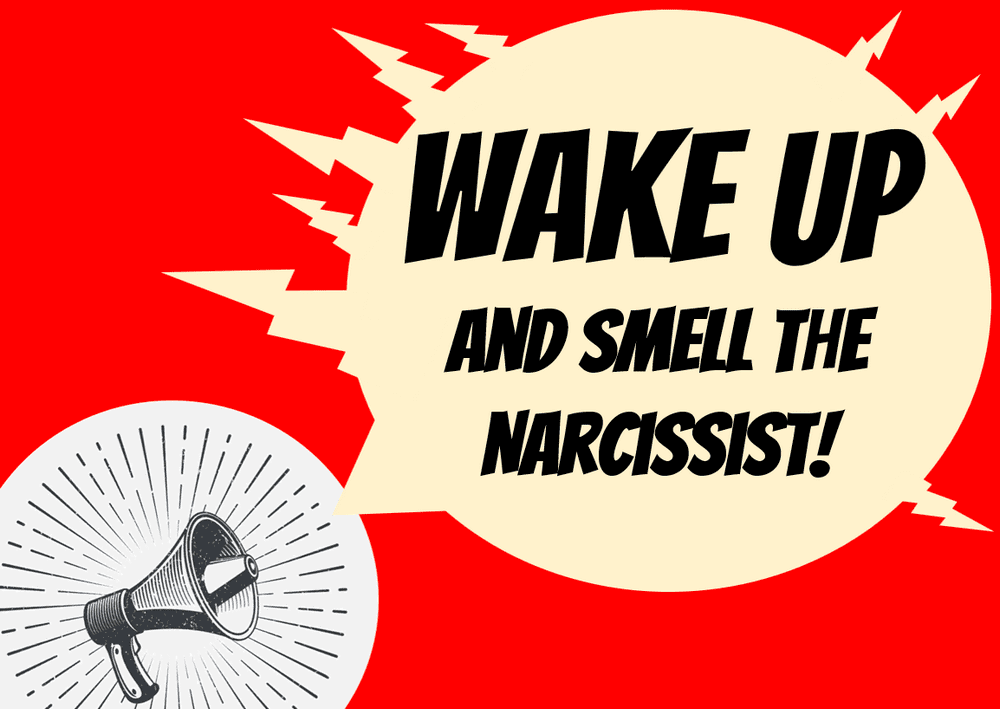Part One
It’s one thing to find someone who already knows their partner is a narcissist; it’s quite another to meet someone who’s still stuck in a relationship with no clue why life is so filled with conflict, confusion, and chaos.
What an “a-ha” moment to figure out the root cause of all the trouble, to understand that the problem is surprisingly common, and has a name.
Mine was an unusual discovery, and I first got a hint of what was going on when my severe malignant narcissist ex-wife called me a narcissist.
I had known for many years that she projected her own negative traits onto others; that was actually the first narcissistic trait that I had identified in her. So, when she made this comment, I decided to look up “narcissist” online, found a general article on Wikipedia, and what I read made my jaw hit the floor. It was the moment that my long journey of discovery and, eventually, healing began.
Lisa and I often discuss how we can find those people who are still in the dark – those we can do so much for. After all, they’re not online searching for “narcissist” because they have yet to figure it out.
So, we posted the question, “How did you realize your spouse or significant other was a narcissist?” on Quora, where there is a robust community of people in recovery from narcissistic abuse. The answers were fascinating and diverse, but common themes emerged also.
Most people realized there was something “off” about their partner while still entrenched in their relationship, and long before having any clue about what narcissism actually was.
Bill, for example, had been trained to choose his words very carefully so as not to set off his partner (the common term for this is “walking on eggshells”). When he’d finally had enough of her controlling behavior and said so, the angry backlash he suffered led him to look up what it means to be a pathological liar. The description matched perfectly. Later, he uncovered infidelity and more online searches helped him put it all together.
In the responses we received, it seemed like the majority of people didn’t realize that narcissism (or another toxic personality disorder) was the core problem until after the relationship ended. Instead they recognized individual traits, and only later managed to connect the dots.
Estelle noted all of the following narcissistic traits in her partner before seeing the whole picture:
- Blaming and lack of accountability
- Silent treatment as a form of control and punishment
- She had to do all the emotional work on the relationship
- Lack of empathy
- Chronic infidelity
- Pathological lying
Benjamin suffered from the effects of Complex PTSD and couldn’t come to grips with how completely uncaring his partner was. He did finally recognize a flood of symptoms, including:
- Lies
- Manipulation
- Gaslighting
- Lack of empathy
- Lack of remorse
- Lack of emotional intelligence
- Victim mentality
- Self-loathing
- Entitlement
- Emotional coldness
Before Michelle knew it was narcissism, the first thing she recalled thinking was how strange it was that her partner never complimented her sincerely. On the contrary, he’d routinely make snide remarks about how she was “dressed up” when all she had really done was put on a little makeup. Interestingly, he didn’t start behaving this way until after they were married, which is typical, as an abuser’s behavior can dramatically change after a victim is secured in the relationship.
Is this topic front and center for you right now? BTGO has an interactive workshop that goes far beyond what we cover in this post. Learn more.
Knowing what she knows now, Michelle also recalled what should have been early warning signs that she missed, including how agitated her ex-husband would get if she pressed him to talk about his past, and his claims that his prior romantic partners were all “crazy.” Geri’s ex-husband also claimed that all of his exes were crazy, adding that they were “still in love with him.” Referring to multiple exes in either of these manners is often a red flag behavior of narcissists.
Toxic people often need to make themselves appear as though everyone adores them. My ex, who is a part-time teacher, claimed that her kids were all crying on the last day of school because they “love me so much!”
“It always struck me as strange that, even after many years together, my ex never really got to know me,” John said, which is commonly felt by intimate partners of narcissists, as is his feeling that everything had “strings attached” or was “conditional.”
Scorn is also frequent in narcissistic relationships. Maria’s ex-husband would belittle her possessions, like her “mom car.” When Dan’s ex-wife insulted him, and he’d call her out, she’d claim she was “kidding” or chided him for being “too sensitive.” My ex did this all the time, saying “lighten up, Francis” (from the movie “Stripes.”) This dismissal of another’s feelings is something we hear all the time.
The number one clue that multiple people cited as being what led them to understanding was the failure of a partner to respect boundaries. By the time I was the hollowed-out shell that I became later in my marriage, I would never have even thought about boundaries; my ex-wife had long since obliterated them.
Lisa and I have dedicated ourselves to helping others suffering in, or struggling to get out of, abusive relationships with toxic partners. We’re using everything we’ve learned – and continue to learn – to help others save time, money, and energy and protect themselves and their children in what, for most, is one of the most difficult experiences of their lives.
In the next post in this series, I’ll share some more stories from the trenches, and dig a bit deeper into how effective various search terms are at getting results that quickly point to a toxic personality disorder.
Editor’s note: If you’re just waking up to the real cause of the issues in your relationship, and you’d like to know more, consider viewing our FREE interactive workshop, Wake Up & Smell the Narcissist: Reviewing the Toxic Relationship Quiz, which is available in BTGO’s Sanity School now.


